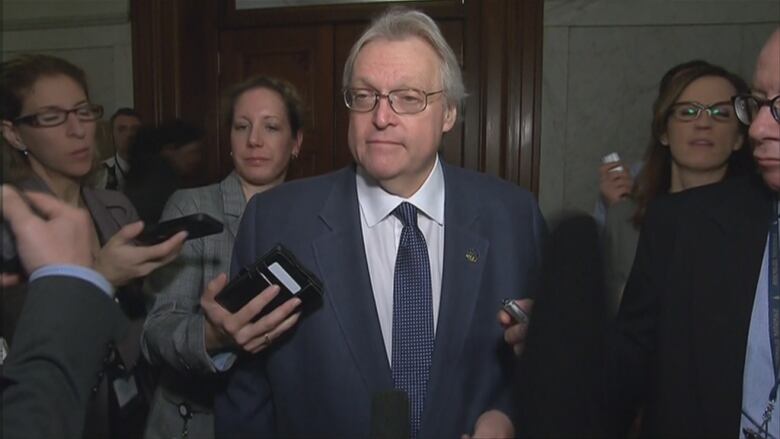Quebec end-of-life law contradicts Criminal Code and can't take effect, court says
Province plans appeal of Quebec Superior Court decision that will delay law that was to go into effect Dec. 10

A Quebec Superior Court justice has ruled a provincial law allowing some terminally ill patients to end their lives with medical help cannot take effect on Dec. 10, as planned.
Justice Michel Pinsonnaultsaid key articles inthe new law contradict provisions of Canada's Criminal Code on medically assisted suicide provisions that are still the law of the land until February 2016.
- Doctor-assisted death in Quebec could face delay: Health Minister Gatan Barrette
- Quebec doctors' group to contest end-of-life care legislation in court
Canada's Supreme Court ruled lastFebruary that Canadians with unbearable and irremediable suffering could be eligible to end their lives with a doctor's aid, but the justices stayed their decision until February 2016 to give Parliament time to bring existing laws in line with the ruling.
The question of the legality of Quebec's medically assisted dying law, which was passed unanimously in Quebec's National Assembly in June 2014,was brought to the Quebec Superior Court last week by Paul Saba, the head of the Quebec Coalition of Physicians for Social Justice, and Lisa D'Amico, a woman living with life-threatening disabilities.
Saba and D'Amico sought an injunction to contest the provinciallaw.
Justice Pinsonnault did not, in fact, grant that injunction, as previously reported. Pinsonnaultinstead ruled that theprovincial law must be in line with federal laws, which take precedence,and since those have not yet been changed to reflectthe Supreme Court ruling on assisted-suicide, the Quebec law cannot take effect.
It was the federal attorney general, who was an interlocutor on the case,who raised thequestion of whether federal law must take precedence over provincial law until the necessary Criminal Code amendments are made.
"The doctrine of federalpreponderanceapplies in this case and continues to apply until the incompatibility with sections14 and 241b) of the Criminal Codedisappears,"Pinsonnault wrote.
Article 14 states that "no person is entitled to consent to have death inflicted on him" and Section 241b)forbids anyone fromcounselling, aiding or abetting someone to commit suicide.
Pinsonnaultissued a revised ruling Tuesday afternoon after several reportsthattheinjunctionhad been granted making it clear that while the court found that the Quebec law must be put on hold, it was because of its incompatibility with federal law and not because the court had approved the request for aninjunction.
Government to appeal
Within an hour of Pinsonnault's ruling Tuesday, the Quebec governmentannounced it would appeal the decision.
Speaking to reporters at Quebec's National Assembly, Justice MinisterStphanieValleand Health MinisterGatanBarrettecouldn't say for sure whether Quebec's end-of-life law would come into effectDec. 10as planned.

"There's a clear difference between euthanasia and medical aid in dying. Medical aid in dying is a (form of) health care, and it's one of (the forms of) health care that is defined in the act," she said.
"This fallswithin the continuum of health care," she said.
Barrette, standing next toValle at a newsscrum,echoed those comments.
"We have experienced a consensus in this province, in this room, in this assembly," said Barrette. "We think the will of the people has not been heard at this time."
The Parti Qubcois MNA who drafted the end-of-life care legislation under the previous PQ governmentagreed.
"I think it's very important to realize that the legislation in Quebec is really based on our jurisdictionover health matters. It's not about criminal jurisdiction," Vronique Hivon, the MNA for Joliette,told CBC.
Barrettesaid last week that if the injunction Saba andD'Amicohad been seekingwere to begranted, the province would have no choice but to abide by the ruling.
The Quebeclaw on end-of-life care sets out a patient's right to "receive the end-of-life care their condition requires," includingmedical aid in dying, which is subject to along list of requirements that have tobe met before a doctor can administer it.
Quebec Superior Court's revised ruling (PDF KB)
Quebec Superior Court's revised ruling (Text KB)CBC is not responsible for 3rd party content
Corrections
- An earlier version of this story reported that the Coalition of Physicians for Social Justice had, in fact, won its injunction against Quebec's law on medically assisted death. In fact, Justice Michel Pinsonnault did not grant the injunction, ruling instead that key acts in that law cannot take effect as long as Criminal Code provisions against assisted suicide remain in effect - that is, until Feb. 6, 2016.Dec 01, 2015 6:34 PM ET
With files from The Canadian Press












_(720p).jpg)


 OFFICIAL HD MUSIC VIDEO.jpg)
.jpg)



























































































